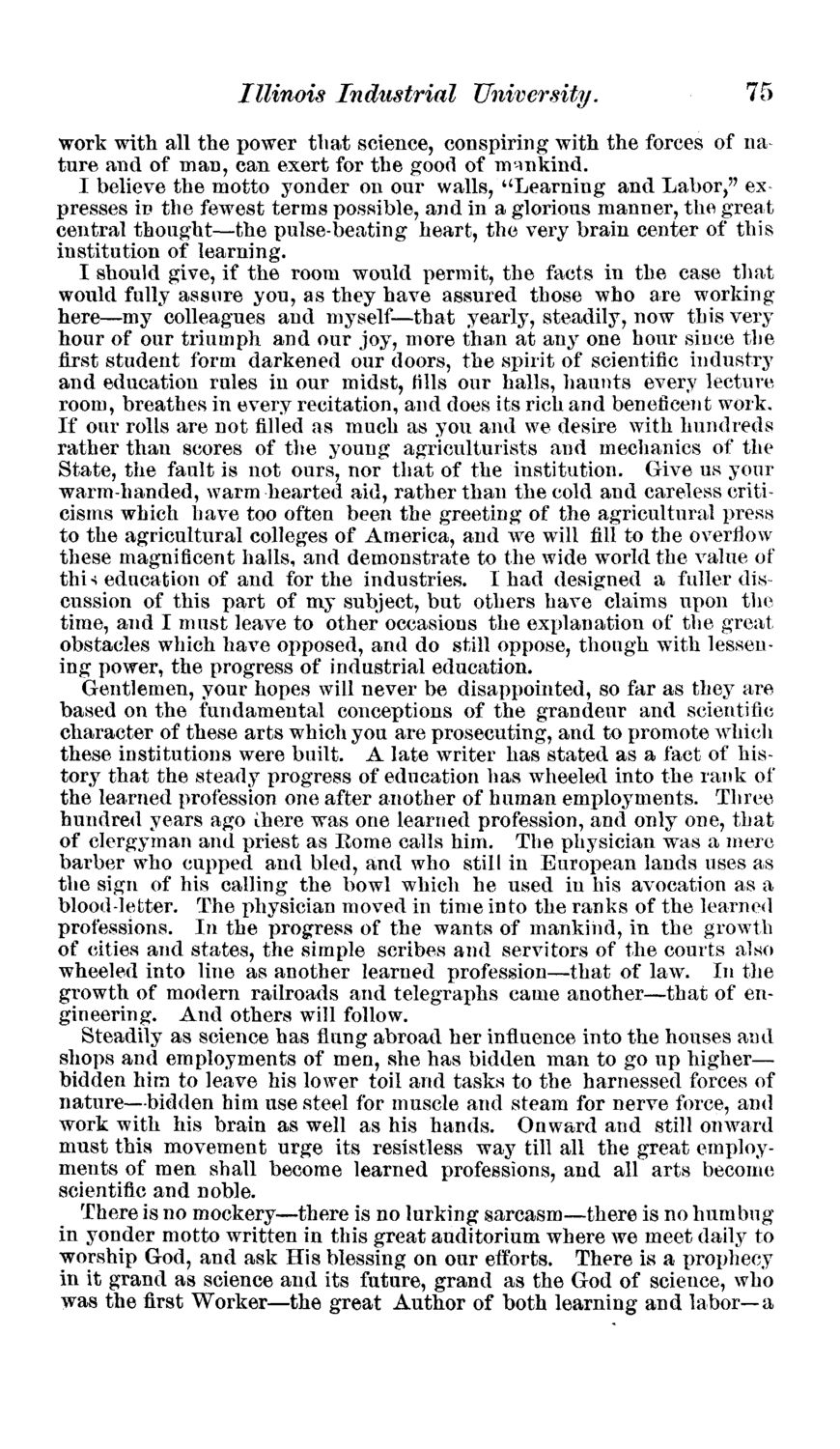| |
| |
Caption: Board of Trustees Minutes - 1874
This is a reduced-resolution page image for fast online browsing.

EXTRACTED TEXT FROM PAGE:
Illinois Industrial University. 75 work with all the power that science, conspiring with the forces of na ture and of man, can exert for the good of nrmkind. I believe the motto yonder on our walls, "Learning and Labor," ex presses in the fewest terms possible, and in a glorious manner, the great central thought—the pulse-beating heart, the very brain center of this institution of learning. I should give, if the room would permit, the facts in the case that would fully assure you, as they have assured those who are working here—my colleagues and myself—that yearly, steadily, now this very hour of our triumph and our joy, more than at any one hour since the first student form darkened our doors, the spirit of scientific industry and education rules in our midst, fills our halls, haunts every lecture room, breathes in every recitation, and does its rich and beneficent work. If our rolls are not filled as much as you and we desire with hundreds rather than scores of the young agriculturists and mechanics of the State, the fault is not ours, nor that of the institution. Give us your warm-handed, warm hearted aid, rather than the cold and careless criticisms which have too often been the greeting of the agricultural press to the agricultural colleges of America, and we will fill to the overflow these magnificent halls, and demonstrate to the wide world the value of this education of and for the industries. I had designed a fuller discussion of this part of my subject, but others have claims upon the time, and I must leave to other occasious the explanation of the great obstacles which have opposed, and do still oppose, though with lessening power, the progress of industrial education. Gentlemen, your hopes will never be disappointed, so far as they are based on the fundamental conceptions of the grandeur and scientific character of these arts which you are prosecuting, and to promote which these institutions were built. A late writer has stated as a fact of history that the steady progress of education has wheeled into the rank of the learned profession one after another of human employments. Three hundred years ago {here was one learned profession, and only one, that of clergyman and priest as Rome calls him. The physician was a mere barber who cupped and bled, and who still in European lands uses as the sign of his calling the bowl which he used in his avocation as a blood-letter. The physician moved in time into the ranks of the learned professions. In the progress of the wants of mankind, in the growth of cities and states, the simple scribes and servitors of the courts also wheeled into line as another learned profession—that of law. In the growth of modern railroads and telegraphs came another—that of engineering. And others will follow. Steadily as science has flung abroad her influence into the houses and shops and employments of men, she has bidden man to go up higher— bidden him to leave his lower toil and tasks to the harnessed forces of nature—bidden him use steel for muscle and steam for nerve force, and work with his brain as well as his hands. Onward and still onward must this movement urge its resistless way till all the great employments of men shall become learned professions, and all arts become scientific and noble. There is no mockery—there is no lurking sarcasm—there is no humbug in yonder motto written in this great auditorium where we meet daily to worship God, and ask His blessing on our efforts. There is a prophecy in it grand as science and its future, grand as the God of science, who was the first Worker—the great Author of both learning and labor—a
| |